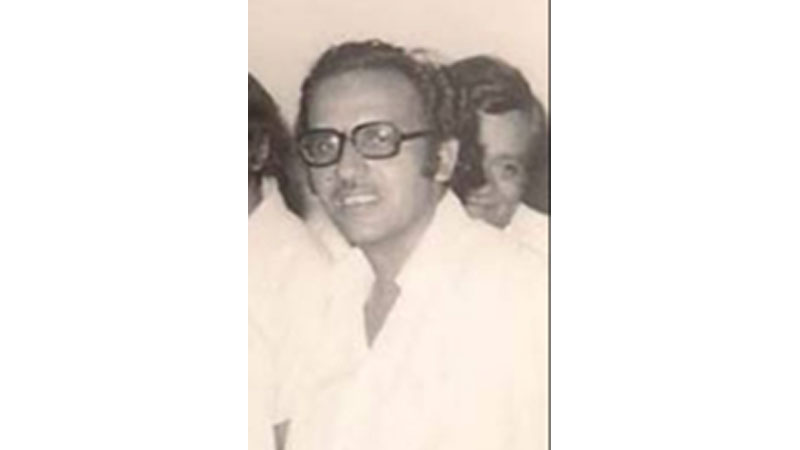Remembering the iconic music composer Master Altaf Hussain


Perhaps because he did not believe in Public Rationing or perhaps being educated, he did not know the tricks and traits of acquiring business in the jungle of music in the melodic era surrounded by all the big wiz music directors of that time. My work with him was always a marvellous experience at PTV and Radio as I too was not a Lollywood person. However he did get fame, though briefly when two of his music compositions became very popular. One was Nasir Kazmi’s Ghazal ‘Dil Main Ik Leher Si Uthi Hei Abhi’ sung separately for a PTV programme by Ghulam Ali and Tasawur Khanum. This programme idea by Farukh Bashir was to appreciate the odour of presentation of the same song by two different vocalists. As the luck would have it, both versions clicked. Rather this Ghazal has become identity of both Ghulam Ali and Tasawur Khanum.
Altaf Hussain became known as Master Altaf Hussain in the latter part of his career on the same pattern as that of his elder brother, Master Manzoor Hussain who was a popular music personality of his time; music compositions and knowledge wise. The other three brothers were Bashir Hussain, Dilawer Hussain and Sarangi Player Imdad Hussain. These five talented sons were born by Master Fazal Hussain, a competent Sarangi Player hailing from Shah Almi Gate, Lahore. So they belonged to Shah Alami Gharana. Basheer Hussain played harmonium and was nicknamed as Professor due to his apt knowledge of classical music.He deviated from the family tradition and became pupil of Akhtar Hussain Khan of Patiala Gharana. Master Manzoor’s inclination on the other hand, was towards Gawaliar Gharana style of music.
Altaf Hussain had a sweet, tuneful voice but due to heart disease of their father, he could not continue with this vocation. Master Manzoor advised Altaf to become a Melody Maker instead. Initially he gave him lessons on how to compose a melody. Altaf cleared his audition test at Radio Pakistan, Lahore and his composition ‘Main Nei Roka Bhi Nahi Aur Woh Thehra Bhi Nahi’ by singer Ghulam Abbas became an instant hit.
Initially Master Fazal Hussain lived in Mozang area. He was pupil of Pyaare Khan of Gawaliar Gharana from whom he learnt tricks and traits of classical music. Pyaare Khan was the father of Umeed Ali Khan. So the style of singing of this school of thought was transferred to Master Fazal Hussain by Pyaare Khan. Master Fazal used to approach Mian Pyaare Khan to learn Sarangi also despite that the latter was a vocalist.
There was no end to making music compositions for Master Altaf Hussain who was also lovingly known as Altaf Lamma due to his height. He was a soft spoken and sweet personality. He was educated and could converse in English with ease. Unlike many music composers of that time who were spiritual disciples of Indian music composer Naushad Ali, Altaf Hussain had once revealed to me that he was impressed with the style of Indian composer Khayyam, especially the compositions he created in Raag Pahari. This revelation was made to me during the recording of Munir Niazi’s Ghazal “Hansi Chuppa Bhi Gaya Aur Nazar Mila Bhi Gaya’ in Broadcasting House Studios in Lahore. Those were the days of music. In Central Production Unit at least two to three daily songs were recorded. It was the untiring efforts of talented music producer Khalid Asghar that he used the studios of BH in the evenings to record his productions. Sometimes the violins were made to stand in the entrance to play their pieces/interludes because the main studio that had housed percussion and string instruments had no space left for the violins. In the evenings the instrumentalists on the role BH as well as CPU combined to make a heavy orchestra. The results were amazingly clear, tuneful and without any noise. There was no problem of budget unlike today when CPU has been disbanded and daily recordings cease to exist.
Apart from the songs mentioned above, Altaf Hussain composed the tune of Atta Ullah Issakhelvi’s popular ghazal ‘Dil Lagaya Tha Dillagi Kei Liye’ that became popular due to its easy melody. Taranum Naz rendered his composition ‘Mujhe Woh Aaj Phir Yaad Aa Raha Hei’. Humera Channa sang ‘Qatra Qatra Dil Main Aanoo Girte Hain’. Then she joined hands with Anwar Rafi to sing Un Kei Chehre Pei Jo Raqsaan Hei Haya Ka Saaya’.
Taranum Naaz also sang ‘Mundairon Pei Jo Diye Jalne Lage Hain’. Altaf composed music for 1993 Pakistani film ‘Gunah’ which was a Parvez Kalim movie. For PTV he composed music for programmes such as Punjnad, Nilaam Ghar, Rut Rangeelari and many more such programmes. I also rendered many songs in his music for PTV.
Altaf Hussain died of heart problem on April 16, 1995. He was born on the first of January 1939.
The writer is the recipient of the prestigious Pride of Performance award. He can be reached at doc_amjad@hotmail.com
Leave a Comment